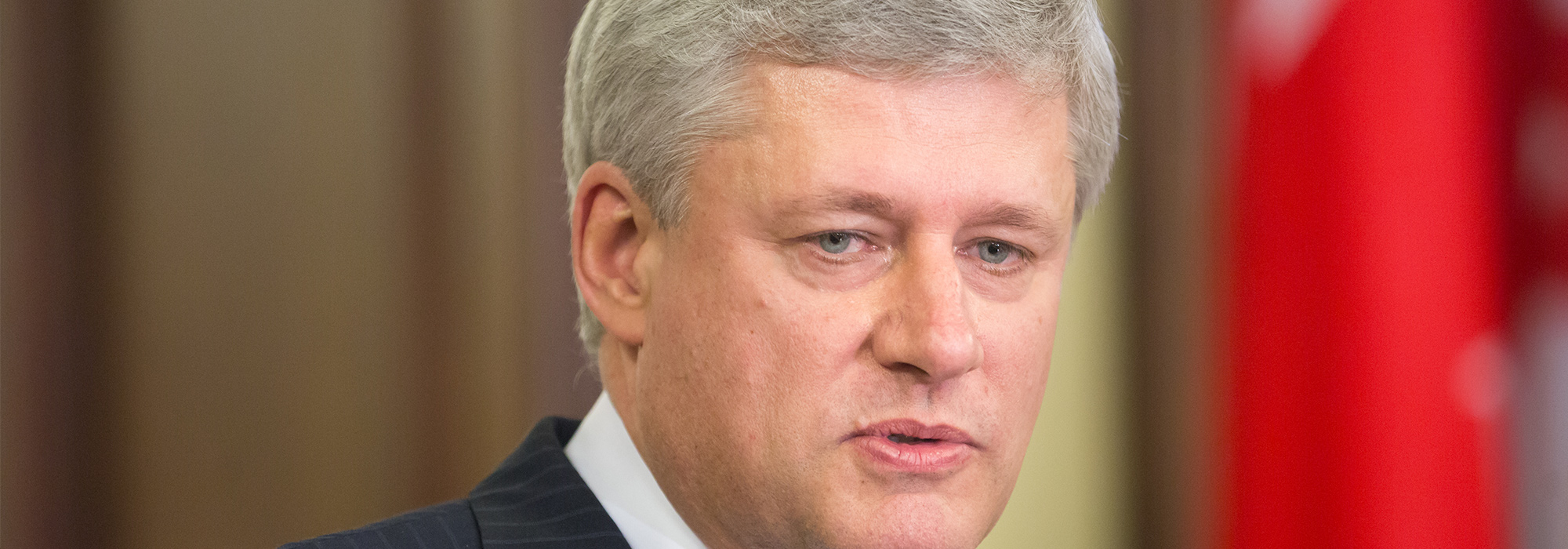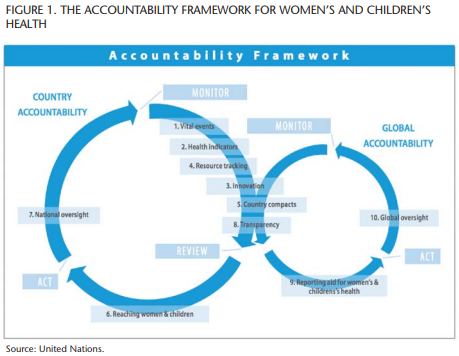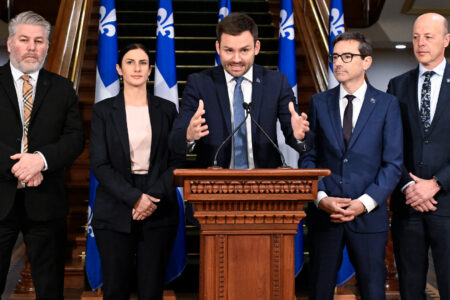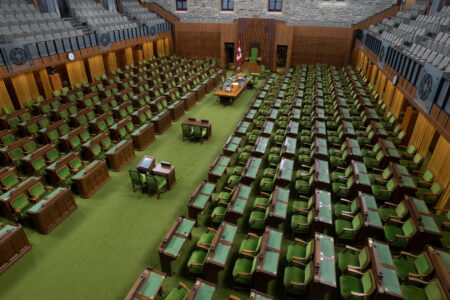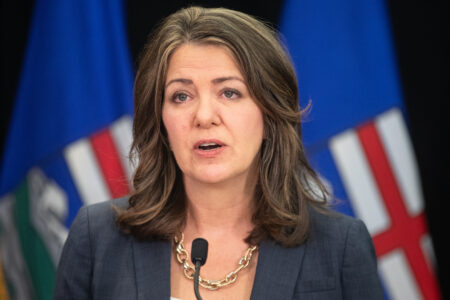
Addressing the Conservative Party faithful at their Ottawa convention in mid-June, Stephen Harper spoke of a world where “power is shifting.” “In such a world,” he declared, “strength is not an option: it is a vital necessity.”
In the new world, declared the Prime Minister, we must “also have a purpose — and that purpose is no longer just to go along and get along with everyone else’s agenda. It is no longer to please every dictator with a vote at the United Nations…Moral ambiguity, moral equivalence are not options; they are dangerous illusions…We know where our interests lie and who our friends are.”
Blunt talk. A Manichean view of the world. Harper claimed for Canada a moral, muscular purpose where “we take strong, principled positions in our dealings with other nations — whether popular or not and that is what the world can count on from Canada.”
The PM came back to these themes in a subsequent discussion with Maclean’s. We are rearming, he said, even with the drawdown in Afghanistan, because “when you’re in a dangerous world and countries are from time to time called upon to do things to deal with those dangers, if you don’t have the capacity to act you are not taken seriously…We have to be prepared to contribute more.”
Harper told the Maclean’s editorial board that “the ability of our most important allies, and most importantly the United States, to single-handedly shape outcomes and protect our interests, has been diminishing.”
He also spoke of the economic situation, saying, “There’s hardly anything today of any significance that doesn’t have a huge international dimension to it, beginning first and foremost with the economy.”
The media took note.
“The Harper Doctrine: Conservative Foreign Policy in Black and White,” headlined the Globe and Mail. The Harper doctrine, wrote John Ibbitson, was defined by our unconditional support for Israel, robust Arctic sovereignty and a closer security and commercial relationship with the United States. Reinvestment in the Canadian Forces would continue while foreign aid would be more reflective of Conservative values — toughened accountability while giving more money for programs that benefit mothers and children.
Canada was back on the international stage, wrote Ibbitson, setting its own terms of reference. But, he warned, “the Harper Doctrine is so categorical, and so starkly at odds with NDP and Liberal values, that foreign policy could increasingly become a polarizing element in Canadian politics.”
Is the Harper approach to foreign policy really so “categorical” as to be “polarizing”? And is it at odds with the trajectory of postwar Canadian foreign policy?
Closer examination would suggest that far from being a bold new departure, it is very much in keeping with Canadian tradition, albeit with a sharper and more conservative tone.
Argue with the taxonomy, but there are essentially three traditions in Canadian foreign policy. The first is the realist, power-and-interest tradition that holds close to the hegemon, initially Britain and then the United States. The external counterpart to Sir John A. Macdonald’s National Policy, it has been followed, in varying degrees, by Macdonald, then Sir Wilfrid Laurier through to Brian Mulroney. The second is the Mackenzie King tradition, nationalist, regional in outlook and both cautious and skeptical about international entanglements. It also appealed to populist, regional third parties from the Progressives through the Bloc Québécois. The third is the St-Laurent-Pearson tradition, further refined by Pierre Trudeau and Jean Chrétien: strongly nationalist and internationalist — assertive, energetic, with an emphasis on international law and institutions.
Harper’s record suggests his approach to foreign policy fits comfortably within the realist, power-and-interest tradition. At the outset the new PM promised to “build the relationships and the capabilities which will allow us to preserve our sovereignty, to protect our interests, and to project our values…in a shrinking, changing, dangerous world,” he declared in his first major foreign policy speech in October 2006. He continued: “Our government must play a role in the world. And I believe that Canadians want a significant role — a clear, confident and influential role…They don’t want a Canada that just goes along; they want a Canada that leads. They want a Canada that doesn’t just criticize, but one that can contribute. They want a Canada that reflects their values and interests, and that punches above its weight.”
The statement could easily have been delivered by any of his predecessors. Nor does an examination of Ibbitson’s definitional points — Israel, the approach to the United States, the Arctic, the investment in the Canadian Forces, accountability for aid and negotiating more free trade agreements — reveal a divergence from the traditions of Canadian foreign policy.
The Harper government, with support from the Liberals, has sharpened our stand by walking out or boycotting forums (e.g., Durban III). Is the motivation electoral, as some have suggested? It would make more sense to go after the Muslim vote. Muslims already outnumber Jews in Canada by at least two to one and immigration will only further swell their numbers.
Even when there is a partisan difference, as on climate change, or with the emphasis on the Americas rather than Africa, these are hardly “polarizing.”
Since the creation of the Jewish homeland, we have consistently, and correctly, stood in Israel’s corner, notwithstanding bobbling under Mackenzie King and some juggling during the Suez crisis. We’ve consistently resisted any equation of Zionism and racism. The Harper government, with support from the Liberals, has sharpened our stand by walking out or boycotting forums (e.g., Durban III). Is the motivation electoral, as some have suggested? It would make more sense to go after the Muslim vote. Muslims already outnumber Jews in Canada by at least two to one and immigration will only further swell their numbers. The Tories, like the Liberals, favour a two-state solution but we are never going to lead in solving the Middle East situation. There are plenty of other exercises under way: contact groups, Tony Blair and various other initiatives. Better we should lend support where we can do some good, like the Jerusalem Old City initiative, and use trade policy to promote jobs and commercial development, as we have done in our free trade agreement with Jordan in 2009.
Failing to win a UN Security Council seat in October 2010 has been cited by various critics as payback for our moral, if contrarian, support for Israel, as well as divergence from conventional opinion on climate change and the perception that we’ve abandoned Africa.
A closer examination reveals that our loss had more to do with bloc voting and the cohesion of the European Union. Canada, Australia, New Zealand and Israel are lumped into the Western European and Other Group (WEOG). The European Union does its internal arbitrage, obliging the rest of us to effectively run as independents. The odds are permanently against us. As political scientist Denis Stairs pointed out in his useful March 2011 analysis for the Canadian Defence and Foreign Affairs Institute, Being Rejected in the United Nations: “Canada may now be getting hoisted on its own petard because it is being overtaken by other players — players with far more assets available than Ottawa for foreign policy deployment.”
Stairs has drawn the right lesson for Canada: “We need to recognize that the United Nations has become a very heavily populated institution, and even among the longest-standing members, a few that were effectively incapacitated during the early postwar decades are now rising and powerful stars.” Better for us to recognize geography and realign from the WEOGs into the Americas group.
The comical “Fossil of the Year” award notwithstanding, it’s doubtful that the Harper approach on climate change has cost us. The Chrétien government acceded to Kyoto but there was little action. When given a choice in the 2008 election, Canadians rejected the Dion “green shift.” Nor has the Green Party enjoyed anywhere near the success of its European counterparts. The Copenhagen debacle and the inability of the central players, the US and China, to find common ground are what has diminished the United Nations Framework Convention on Climate Change process.
The debate within Canada around energy and the environment is symptomatic of another rule of politics. What may constitute good public policy — taxing carbon, ending sales of asbestos, abandoning supply marketing, permitting foreign investment in our resources is not always good politics. Regional differences make national consensus difficult. National unity comes with a price and there is more than a little wisdom to F.R. Scott’s lampoon of Mackenzie King:
“Do nothing by halves / Which can be done by quarters.”
While putting on the blue beret has considerable romantic appeal, Canadians have not led in peacekeeping for a couple of decades and contemporary circumstances make it unlikely we’ll do so again soon. In part, there has been an effort to “regionalize” peacekeeping pools, and in part, as Denis Stairs points out, contributing to UN peacekeeping operations is “a source of badly needed foreign exchange” for the main source countries — Bangladesh, Pakistan, India and Nigeria.
Technology and more failing states mean what is required is less peacekeeping than peacemaking or peace enforcement or acting as a first responder to disasters. To echo historian Jack Granatstein, we owe former chief of defence staff Rick Hillier a great debt for “changing the conceit that Canadians were peacekeepers first, last and always.” Our experience in Afghanistan has given us the “best little army” in the world, and the skills we’ve developed proved adaptable and effective in the relief of Haiti after the hurricane. This is a much more realistic role for Canada, and while Canadians wanted us out of a combat role in Afghanistan, there is strong public support for the Forces. Rather than flog the dead horse of peacekeeping, the bigger policy question for Canadians is how far, and how much, we should commit to duties beyond our border that actively involve us in other people’s conflicts with significant risk to the lives of Canadians. Observes Australian diplomat-scholar Owen Harries: “The successful promotion of democracy calls for restraint and patience, a sense of limits and an appreciation of the wisdom of indirection, a profound understanding of the particularity of circumstances.”
As we have learned in Afghanistan and Iraq, liberal democracy is not an easy transplant and any policy of imposing it through force will also fail.
Acting with the best of intentions is inherently difficult to translate into significant change because of the extent to which they depend on other people and other, often intractable societies.
The 2008 Canada First Defence Strategy gives teeth to our ambitions in homeland defence and in making a necessary contribution to collective security: “A handful of soldiers is better than a mouthful of arguments, » said Harper in Trapani, Italy, the base for RCAF CF-18s flying over Libya, “for the Gadhafis of this world pay no attention to the force of argument. The only thing they get is the argument of force.”
Restoring the traditional designations — Royal Canadian Navy, Canadian Army and Royal Canadian Air Force — to strengthen their identities as national institutions is a positive step.
But the real test for the Conservatives will be to meet the new recruitment targets, ultimately 100,000 personnel (70,000 Regular Force and 30,000 Primary Reserve), and to meet the procurement timetable for the new ships and planes that will “give us the ability to act.” Our procurement process is inadequate. As the Auditor General and the Canadian Association of Defence and Securities Industries (CADSI) and others have pointed out, the likely result is that new kit will be delayed, abandoned or diminished in quality and quantity. We need to quickly develop a defence industrial strategy and a viable shipbuilding industry. A useful first step would be to look to the experiences of our British and Australian allies.
The debate within Canada around energy and the environment is symptomatic of another rule of politics. What may constitute good public policy — taxing carbon, ending sales of asbestos, abandoning supply marketing, permitting foreign investment in our resources — is not always good politics.
“Northern” policy goes back to Sir John. A. Macdonald but few prime ministers have devoted the time and attention to it that Harper has. It is central to his policy and embedded into the Conservative brand. The 2010 Arctic foreign policy statement sets as our objective a “stable, rules-based region with clearly defined boundaries” and an important environment in which “dynamic economic growth and trade” can take place.
The Harper approach fits comfortably with Canadian opinion. An extensive Ekos survey in the fall of 2010 found that a majority of Canadians see Arctic sovereignty as the country’s top foreign policy priority. Canadians also believe military resources should be shifted to the North, even if it means taking them away from global conflicts.
In restructuring the Canadian Forces when it took office in 2006, the Harper government created a new Canada Command, and its northern responsibilities comprise 40 percent of Canada’s land mass and 75 percent of our coastal regions. Travelling north, as he does every summer, to observe our increasingly sophisticated Operation Nanook military exercises, the Prime Minister remarked after the 2010 exercises that “we’re doing it because this is about nation building. This is the frontier. This is the place that defines our country.”
Yet, argues UBC professor Michael Byers, “when it comes to the Arctic, the Prime Minister is all hat and no boot” and the Americans noted in a January 2010 cable (released by Wikileaks) that the Harper government has been slow in purchasing the sensors required for increasing surveillance over the Northwest Passage and building the armed icebreakers necessary to demonstrate sovereignty.
These tools will be necessary if Canada is to negotiate seriously with the Americans on the status of the Northwest Passage and the maritime border in the Beaufort Sea. A deal is probably doable. Former US Ambassador Paul Cellucci acknowledged in 2007 that “it’s in our security interests that the Northwest Passage be considered part of Canada” and the Ekos survey revealed that 62 percent of Americans are willing to “work to strike a deal with Canada over the disputed territory,” although what is at dispute is not territory but an international strait.
In arguing for greater aid effectiveness, Stephen Harper echoes a theme that dates back to Mike Pearson’s Partners in Development (1969). The CIDA focus on fewer countries, the Aid Effectiveness Agenda, began with the Martin government as the result of an international peer review process involving major donor countries. Harper is co-chair of the UN commission designed to follow up on his G8 Muskoka Initiative on Maternal and Child Health and its first report this past May, Keeping Promises, Measuring Results, lays out a useful accountability framework (figure 1).
As part of the decision to make the Americas a strategic priority, the Conservatives have shifted Canada’s development focus to the Americas from Africa but it is inaccurate to say that Canada is ignoring Africa. Seven of the 10 countries that are the focus of the Muskoka Initiative are in Africa. We’ve doubled our food aid to Africa since 2002, making us a leader in the G8. Canadian food aid is now also completely “untied,” as long encouraged by the development community, and we are on track to fully untying all of our aid by 2012.
Africa has been the recipient of an estimated $1 trillion in aid during the past 50 years. The recurring famines, corruption and inability of Africans to deal with dictators like Zimbabwe’s Mugabe has created both donor fatigue and increasing skepticism about the efficacy of aid.
Aid effectiveness and how to accomplish development are undergoing another healthy rethink. Accountability is an important dimension. So is the role of the private sector. Intelligent critics like Paul Collier and William Easterly argue that an overly bureaucratic approach has created a culture of dependency that does little to create jobs, while Dambisa Moyo’s Dead Aid argues that aid is the fundamental cause of poverty.
In his work on aid effectiveness, Harper should consult with Brian Mulroney. Stephen Lewis remarked in an interview with the CBC’s Brian Stewart that Mulroney “had a particular feeling about the continent and there was that underdog feeling of Mulroney’s where you want to come to the aid of the beleaguered. It was a fascinating dimension of the man, which is not widely appreciated by Canadians.”
Harper has taken Mulroney’s advice on our most important relationship — that with the United States, especially his dictum “that we can disagree without being disagreeable” and that we always achieve more when we start with what is on their agenda. At the New York Economic Club in September 2006, Harper told Americans what Canada offers: “First, a strong and robust economy and, in particular, an energy industry that is increasingly one of the most important in the world; second, a strong partnership in building both a more competitive and more secure North America; and third, a common will to advance, in concert with our democratic allies, our shared values and interests throughout the world.” He also reminded the audience that Canada is America’s main export market and that sales produce more jobs for Americans.
Former US Secretary of State Condoleezza Rice dismissed the Canadian tendency to focus on the bilateral irritants at meetings between the president and the prime minister as akin to turning the top table into a “condominium” meeting. The White House “readouts” of Harper’s telephone calls with President Bush and now President Obama illustrate that their conversations have focused on the international situation. As Mulroney has also observed: “Canada’s influence in the world is measured to a significant degree by the extent to which we are perceived as having real influence in Washington.”
The Harper approach is working. Months after taking office he achieved a settlement on the softwood lumber dispute in September 2006. Renewal of NORAD in May 2006 included, for the first time, a warning function for our continent’s maritime approaches.
He has properly delegated to his ministers and to our ambassadors most of the transactional issues — the 2010 reciprocity agreement on procurement and the still unresolved permit for the Keystone XL pipeline extension.
Harper recognizes that if he is to secure access for our goods and people he needs to focus on what America wants — legislated copyright protection and confidence about continental security. The Washington Initiative around “beyond-the-border” issues and regulatory reform offer real potential for both security and mutually profitable economic integration. We need to be on our game, working in Washington but also through our network of consulates, which can galvanize our allies in business and labour and remind them of the jobs and investment that depend on Canada. The “hidden wiring” of governors and premiers and state, provincial and territorial legislators is already at work.
The US will always be our primordial relationship, but, like its predecessors, the Harper government is actively pursuing global economic opportunities with other partners. Since 2006 it has concluded free trade agreements with nine countries, including four in the Americas — Honduras, Colombia, Peru and Panama. Negotiations are under way with close to 50 others including the European Union and India. All are incrementally important, especially with the Doha Round on life support. We should redouble our efforts to gain a seat within the Trans-Pacific Partnership, with its entrée into the Asia Pacific region.
China was initially, unnecessarily, cold-shouldered because of human rights. It took a while, but Harper eventually came to recognize that his personal engagement was necessary if we were to make headway. He has come to appreciate that the national interest is best served by following the approach of his predecessors — Trudeau, Mulroney and Chrétien — of constant engagement with respect for “face.” The relationship is now back on track, with Harper planning a second trip in the fall to advance discussions on trade and investment.
Having won re-election and secured a majority government in troubling times, Harper achieves new standing among world leaders. Admired for his political skills, he is also acknowledged, as is Finance Minister Jim Flaherty, for Canada’s prudent financial and economic management. Inevitably, he will be called upon to pull greater weight on the international stage, as Canada has done by stepping up and playing a leading role in the NATO-led air campaign over Libya, which forced Moammar Gadhafi from power after 42 years. Indeed, a Canadian, Lieutenant-General Charles Bouchard, was the commanding officer of the six-month campaign, in which not a single NATO casualty was suffered.
There is already encouragement to conduct a foreign policy review. It would be a mistake. Foreign policy reviews for those involved in them are like a visit from the dementors — they suck all the energy out of the system at a time when the system needs its best brains working on real issues. Instead, look to the already published series of very good area studies — FOCAL has produced excellent work on the Americas, and, for an overview, the Canadian International Council’s “Open Canada: A Global Positioning Strategy for a Networked Age,” which is better than anything the system can produce. A more useful exercise would be to examine our capacity to deliver on our international objectives, and the role of our Foreign and Trade Commissioner Service. A series of internal “transformations” within the Department of Foreign Affairs and International Trade have left it confused about its purpose. Public diplomacy has been largely abandoned and cultural funding eviscerated. Voodoo accounting has left it impoverished. Meanwhile, there has been a revolution in the tools, especially in social media, now available to diplomacy.
Harper should commission a task force on the Foreign Service (it’s been 30 years since the McDougall review commissioned under the Clark government) to recommend on its priorities, requirements and resources, trade-offs and limitations. The Afghan and competition task forces are obvious models. With leadership and reinvestment, we can once again punch above our weight internationally and at the same time advance our trade and economic agenda.
In the new multicentric world, geography and demography gives Canada two distinct advantages. First, our proximity to the United States. It may not be the “hyperpower” any longer but it is still the “default” power. As it reassesses its international exposure, it will welcome both the intelligence that can come from a reinvigorated Foreign Service and our Forces’ expeditionary capacity. Second, intelligent immigration policy means we have become a homeland to the world. We claim to practise pluralism better than anyone else and, as the Aga Khan has noted, this is “shareable.” We’re an integral part of the Indian and Chinese diaspora, although, as the Asia Pacific Foundation argues, we need to “actualize” this advantage.
Aligning these advantage with Stephen Harper’s international game plan doesn’t amount to a doctrine. But it does give Canadians a practical road map that reflects both our interests and our values and fits comfortably within our internationalist-realist foreign policy tradition.
Photo: Drop of Light / Shutterstock



